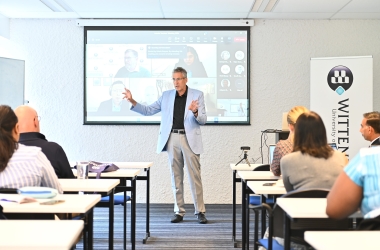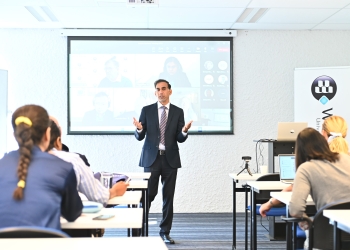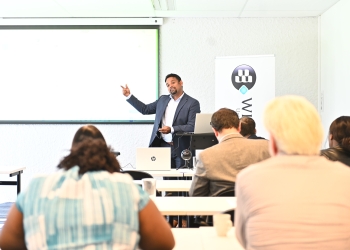Wittenborg Online News!
Wittenborg Kickstarts New Academic Block with Interim Teachers' Meeting
Wittenborg Kickstarts New Academic Block with Interim Teachers' Meeting

Wittenborg Kickstarts New Academic Block with Interim Teachers' Meeting
Highlights Include AACSB Accreditation Update, AI in Education and Continuous Improvement
On 27 August, Wittenborg hosted its interim teachers' meeting at its Brinklaan campus in Apeldoorn, welcoming over 40 faculty members both online and in person from its Apeldoorn, Amsterdam and Munich study locations.
Rauf Abdul, Head of the School of Business, opened the meeting by extending a warm welcome to new colleagues joining Wittenborg. Following this, Peter Birdsall, President of Wittenborg, greeted all faculty members as they returned from the summer break.
Birdsall then provided an update on Wittenborg’s progress towards achieving AACSB accreditation. The school has received its third progress report and is now advancing to the next stage: the formal application.
"It was quite exciting this summer," Birdsall remarked. "At the end of this year, we should have reached the five-year period after having started the initial accreditation process. I think we can be quite confident if we just carry on in the way that we have done in the past years that there will be a good opportunity."
He highlighted the benefits of AACSB accreditation, particularly for students, noting that graduates from AACSB-accredited business schools are often preferred by top companies due to the high standard of this accreditation in business education.
Birdsall also emphasised the importance of faculty contributions, assurance of learning, and the integration of Sustainable Development Goals (SDGs) into the curriculum—areas that Wittenborg has focused on significantly.
Following Birdsall’s address, Abdul led a discussion on Teaching Delivery Updates and conducted a Q&A session. He covered topics such as Expected Standards for Teaching and Research, the impact of AI (Artificial Intelligence) and Continuous Development.
"We want to set clear expectations for teaching," Abdul explained. "During the first session, it is important to take students through the module guide, outlining key objectives, content, and assessment criteria. This clarity will help students understand what is expected by the end of the block."
Abdul also expressed appreciation for the faculty's support, especially in navigating the challenges posed by AI generative tools over the past year. "This remains an ongoing agenda item for us. We are continually working to find better solutions to ensure AI-proof assessments and examinations."
The meeting also addressed concerns about maintaining academic integrity amid the rise of AI. The future implications of AI was also a key topic. Dadi Chen, Deputy Head of School of Business, emphasised the need for consistency in grading and the use of AI. He proposed creating specific sections where AI use is permitted and others where it is not, ensuring that students clearly understand the school’s policies.
The meeting also featured a Moodle workshop led by Wittenborg's Head of Operations, Lasantha De Silva. Moodle, Wittenborg’s Learning Management System (LMS), is used to manage, deliver, and assess training and learning.
Round table discussions followed, focusing on the integration of ‘No Poverty’ in teaching, led by George Bosire with support from Rene Rijnders, and the integration of AI into teaching and assessments, led by Adeyemi Banjo with support from Nikita Pawa.
Reflecting on the meeting, Abdul noted, "It was a great start to the new academic block after the summer break. We had insightful discussions on didactic and pedagogical approaches, as well as the impact of AI on higher education, particularly in assessment and examinations. It was also a wonderful opportunity to welcome new faculty members. Here’s to a year of excellent teaching and enriching student experiences!"
WUP 30/08/2024
by Erene Roux
©WUAS Press



594 words